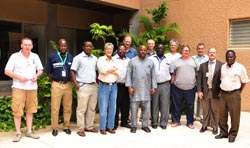| The new Business Incubator Platform on the IITA campus in Ibadan continues to expand with the planned construction of a new inoculum plant. Last week, engineers from IITA’s Facility Management Services met for two days with scientists from IITA and Wageningen University, the Netherlands, and from Legume Technology, a commercial inoculum producer from the UK, and collectively designed the plant’s structure and anticipated operations. |
|
The N2Africa project on promoting legume technologies among smallholders in Africa and other projects have demonstrated strong productivity and economic benefits of soyabean seed inoculation with nitrogen fixing rhizobia. Even with the so-called promiscuous soyabean varieties that have been bred to nodulate with rhizobia naturally present in the soil, significant yield responses to inoculation have been observed in the majority of test fields in northern Nigeria and Ghana. There is currently no commercial inoculant production in West Africa, and imported inoculants are often not available to farmers and come in packet sizes inappropriate for smallholders. Given the large potential of this technology on the 0.5 million ha of soyabean grown in Nigeria, IITA will construct a pilot inoculum plant with assistance from the Bill & Melinda Gates Foundation-funded N2Africa project.
Building upon experiences with inoculum production in Kenya and the UK, as well as the Aflasafe plant at IITA, the objective of the new plant is to produce high-quality, sterile inoculum for soyabean farmers using innovative technologies. To do so, IITA staff will receive training in inoculum production and quality control at Legume Technology in the coming months. When the construction of the newly designed inoculum plant is finished in October this year, inoculum production will start immediately at a modest scale using imported sterile sachets with carrier material that will be injected manually with locally produced rhizobia. In a next phase, the production of sachets with carrier material can be localised and the filling of sachets with rhizobia can be automatized, increasing the scale of production and reducing risks of contamination. An applied research program to optimise the production process and guarantee quality control will be established alongside. The plant will serve as a business model for private investors in Nigeria and other African countries.
Like legumes and rhizobia working in symbiosis with each other, FMS engineers and scientists greatly benefitted from each others’ complementary expertise needed to design a functional inoculum plant. The building has to be sufficiently flexible to allow for changes in the production process over time and include climate-controlled rooms for product curing and storage. The participants were very satisfied with the final design and look with great excitement to the work and future developments around the plant.
Linus Franke

